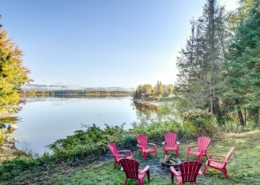Airbnb vs Vrbo: Which Is Best for Hosts and Travelers?
- Airbnb vs. Vrbo: Vacation Rental Types
- Airbnb vs. Vrbo: Ease of Use and Functionality
- Airbnb vs. Vrbo: Service Fees
- Vrbo vs. Airbnb: Cancellation Policy
- Vrbo vs. Airbnb: Selection and Audience
- Vrbo vs. Airbnb: Making Reservations
- Vrbo vs. Airbnb: Quality of Customer Service
- Vrbo vs. Airbnb: Reviews
- Vrbo vs. Airbnb: Safety for Travelers
- Vrbo vs. Airbnb: Special Features
- Snapshot: Airbnb and VRBO Differences Summarized
- Where Should Property Owners List Their Vacation Rental Properties?
At first glance, Airbnb and Vrbo appear to have a lot in common and provide both homeowners and visitors with similar services. There are a few minor variations that a vacation rental owner will need to be aware of, even though both were created as an alternative to hotel accommodations.
Airbnb was founded in 2008, and as of December 2021, they boast 6 million active listings in more than 220 countries. Vrbo (known initially as Vacation Rental by Owner) was founded in 1995 and is now owned by the Expedia Group. According to their website, over 2 million property listings in 190 countries are available on the vacation rental platform.
Even though Airbnb is somewhat more recent than Vrbo, it has already distinguished itself as a rental platform that provides visitors with more distinctive experiences than Vrbo and other vacation rental websites. For instance, in contrast to Vrbo, Airbnb also provides shared spaces.
Even though Airbnb has more listings and offers its services in more nations, Vrbo listings can help homeowners gain more visibility.
No matter which vacation rental website you select or if you decide to advertise your property on both Airbnb and Vrbo, it’s critical to ensure faultless administration and efficient communication.
Hosty — vacation rental software for professional hosts, can help you manage reservations on Airbnb, Vrbo, and other popular short-term rental sites like Booking.com through a single simplified interface. It provides hosts and property managers with a wealth of capabilities, including a powerful multi-calendar, a unified inbox, automated triggered messaging, and much more, to assist you in managing many listings efficiently while saving you significant time.
More about leading vacation rental sites for hosts and travelers.
Airbnb vs. Vrbo: Vacation Rental Types
The different property types posted on each platform clearly illustrate the significant distinctions between Airbnb and Vrbo. This is perhaps one of the main distinctions between these two websites that let you search for accommodations.
Airbnb Vacation Rentals
Airbnb enables hosts and property managers to offer a variety of properties, from luxury vacation rentals and beachfront cottages to individual rooms, cabins, and tiny homes.
This typically means that tourists looking for more distinctive and particular property types can readily locate them on Airbnb. Additionally, hosts can list shared spaces on Airbnb. Travelers can do this by renting individual rooms inside a house rather than the complete residence.
Vrbo Vacation Rentals
Vrbo, on the other side, provides more conventional lodging. Vrbo exclusively accepts reservations for stand-alone vacation homes and does not permit the advertising of shared spaces because it is mainly geared toward family vacations.
As a result, Vrbo residences are more appealing to larger families wishing to rent an entire home while vacationing together.
Vrbo and Airbnb provide short-term rental options, but Vrbo homes are better suited for more extended stays.
While Airbnb is a fantastic choice for shorter visits, the vacation rental site is beginning to add new services in response to a surge in extended stays. Additionally, certain Airbnb homes could provide discounts for extended stays.
Airbnb vs. Vrbo: Ease of Use and Functionality
Vrbo and Airbnb are both simple to use, which is one of the main reasons they are so popular among vacation renters and property hosts.
Airbnb Functionality
Travelers can easily use Airbnb because of its various search filters. Basic search parameters include destination, arrival and departure dates, and the total number of guests (and pets).
In addition to these basic categories, it provides several additional advanced filters to assist Airbnb users in narrowing down their property search even further. The following are a few of the most commonly used search filters:
Service fees need to be paid by both hosts and visitors, regardless of where you opt to list your home. Service fees can impact your overall short-term rental earnings and the total cost of a reservation for a guest. Here is a brief explanation:
- Type of place
- Price
- Cancelation flexibility
- Instant book
- Vrbo Functionality
Vrbo adopts a similar strategy. When starting a search, travelers should enter the destination, dates, and the total number of guests. The platform will then show outcomes that meet these requirements. Users of Vrbo can further refine their search results by using sophisticated filters like
- Property listing type
- Pet-friendly
- Wi-Fi included
- Cancellation policy
- Guest ratings
Airbnb vs. Vrbo: Service Fees
need to be paid by both hosts and visitors, regardless of where you opt to list your home. Service fees can impact your overall short-term rental revenue and the ultimate price a visitor will pay for a reservation. Here’s a quick breakdown:
Airbnb service fees
There are two alternatives for paying the service fee on Airbnb: the split fee and the host-only fee. As the name implies, the split charge halved the service fee between the guest and the host. In this strategy, most of the costs are generally borne by the guests, who typically pay an extra payment equal to 14% of the booking subtotal. In this instance, hosts wind up shelling out about 3% of the overall cost of the booking; however, this number may be higher for hosts who choose to have strict cancellation policies.
The host-only fee allows hosts to avoid charging a guest service fee to guests who book through them by paying the total service price directly to Airbnb. This usually represents 14–16% of the overall cost of the reservation. There is no additional charge for processing credit cards for Airbnb hosts.
For hotels, the host-only fee is required. Additionally, software-connected hosts must comply with this requirement unless most of their listings are found in the United States, Canada, the Bahamas, Mexico, Argentina, Taiwan, or Uruguay.
Higher costs may apply to Airbnb Plus hosts and hosts who choose super-strict cancellation rules. You might anticipate paying considerably more if you decide to provide an Airbnb experience. A 20% service fee is applied to each Airbnb homeowner who provides Airbnb experiences.
The advantage of the host-only fee is that it prevents guests from being caught off guard by the extra service charges, which are only charged at checkout. Hosts always have the choice to increase their property prices to meet the host-only fee modestly. In this method, visitors won’t feel duped because they know the actual cost and are prepared to pay it.
Vrbo Service Fees
Guests often pay a service fee of 6% to 12% of the total cost when making a reservation. Vrbo hosts can select between two service fee options based on their projected annual income. They can pay a $499 yearly subscription fee, including all reservations they receive on the site during the year.
The alternative is to pay a booking charge for each reservation. In this situation, hosts are charged a 3% credit card processing fee, a 5% commission on the rental amount, and any additional expenses (such as a cleaning fee).
A host may reduce hosting expenses by using the annual subscription if they can guarantee that they will receive more bookings than the required minimum. So, a subscription model will make more sense if your salary is more significant than $10,000 and you work as a host full-time, year-round.
Vrbo vs. Airbnb: Cancellation Policy
Airbnb and Vrbo offer cancellation policies to safeguard hosts from the detrimental effects of unforeseen cancellations and to provide guests with a reimbursement if they give hosts adequate notice of their cancellation.
Guests should carefully review listings when making a reservation to determine the host’s cancellation policy. Read the chosen policy’s terms and conditions carefully and pay special attention to them.
Airbnb Cancellation Policy
There are three primary categories of cancellation policies offered by Airbnb: flexible, moderate, and strict. There are also additional scenario restrictions, like Super Strict (30 days), Super Strict (60 days), and Long-Term, some of which they just recently introduced. The flexible policy is unquestionably a favorite with visitors. This policy states that a guest may cancel a reservation and get a full refund up to 24 hours before check-in.
Because guests know they can cancel a reservation and receive a refund if necessary, they are more likely to choose listings with a flexible policy. Making the booking procedure simple and stress-free is the primary goal. This is why selecting the flexible cancellation policy generates more reservations and raises your occupancy rate. If a host cannot find a replacement guest, this strategy may have the drawback of potentially causing a loss of revenue.
Vrbo Cancelation Policy
With Vrbo, hosts can choose from five cancellation policies for their listings: relaxed, moderate, firm, strict, and no refund. Some of these choices provide visitor refunds, while others do not. Due to Vrbo’s flexible cancellation policy, visitors may do so up to 14 days before check-in and still receive a full refund.
Regarding the no refund policy, visitors are not qualified for a return under any conditions or for some time. Additionally, Vrbo protects to lessen unneeded cancellations. Depending on the host’s explanation, you can be eligible for a VBR cancellation waiver. It’s vital to remember that your cancellation will hurt your ranking metrics if you do not get a release.
Vrbo vs. Airbnb: Selection and Audience
The quantity and nature of tourists that a vacation rental website draws, as well as the variety of properties each site offers visitors, are other factors you should consider. The ideal course of action for hosts is to devote time and energy to a website that obtains a lot of excellent traffic. Each month, Airbnb receives roughly twice as much traffic as Vrbo, giving it the advantage.
The vacation rental website with the most extensive assortment of properties will also draw many visitors. With 6 million listings, more than twice as many as Vrbo’s 2 million, Airbnb easily wins the prize for the largest selection of lodgings.
Here is an example that contrasts the options available on each platform in the same place to show the differences. It would help if you considered a website’s target demographic in addition to its overall traffic. You must ensure that visitors to your website are likely interested in the type of property you offer.
In terms of audience, this is how Airbnb and Vrbo compare:
Airbnb Guest Profile
Airbnb attracts younger customers who are looking for more cheap holiday accommodations. In addition, it attracts thrill-seekers who prefer an excursion filled with new experiences to a standard hotel stay.
People who want to rent a home in a famous city for a shorter period at a reasonable price tend to be drawn to Airbnb. Additionally, it offers lodgings with all the amenities needed for business visitors staying in crowded urban locations.
Vrbo Guest Profile
Websites like Vrbo, renowned for having a sizable inventory of houses in tourist locations, are used by travelers looking to book stays in conventional vacation areas. Vrbo primarily appeals to older, family-oriented clientele with the money to pay for a whole house. It will be wise for your business to list your home on VRBO if it is kid-friendly and can accommodate large families or groups.
Vrbo vs. Airbnb: Making Reservations
Booking features are available on both the websites of Airbnb and Vrbo, enabling visitors to make reservations with either the owner or property manager of each listing.
Now, both websites include a proper instant booking function. This significantly improves the convenience of the reservation process for visitors. As the name suggests, it eliminates the need for guests to fill out a booking request and wait for the owner’s approval. Instead, it enables them to reserve vacation rental properties instantly.
Vrbo vs. Airbnb: Quality of Customer Service
Airbnb and Vrbo share the issue of meeting the needs of hosts and guests. Both vacation renters and property hosts are regarded as their
Airbnb customer service
Regarding customer service, Airbnb’s evaluations haven’t always been stellar. While guests are occasionally unsure about the transparency of guest service costs, some hosts believe that the vacation rental marketplace frequently sides with the guests.
However, Airbnb provides a Resolution Center to address issues that hosts can use to request payment or guests can use to request a refund. Airbnb offers mediation services if guests and hosts are unable to agree. After both parties have given their information, a committed team member will evaluate it and make a decision.
How to contact Airbnb and get help read here.
Vrbo customer service
Vrbo, on the other hand, has received fewer complaints from hosts due to its high level of customer care. They may have significantly fewer rentals on their website, which could be a contributing issue.
Anyone who needs assistance can get in touch with Vrbo Customer Support. It is accessible by phone or online chat around the clock. Their customer support team may also assist hosts and property managers with managing the calendar, listing, and rebooking any guests who may have been impacted during their stay in the event of a natural disaster.
Vrbo vs. Airbnb: Reviews
Even though reviews are essential for both services, there are some significant differences between Airbnb and VRBO.
Airbnb Reviews
Airbnb promotes the culture of reviews and invites visitors to post reviews after their stay. Each party has 14 days to submit an evaluation. The five-star rating system used by Airbnb asks users to score the accuracy of the property description, cleanliness, communication, location, check-in, and price. Guests can select lodgings by reviews to find the best match for their needs before making a reservation if they have specific reservations about an Airbnb.
How the Airbnb review system works read here.
Vrbo Reviews
A review can be written up to a year after a stay by either a guest or a host. However, after one of the parties submits a review, the other party has 14 days to respond with their evaluation.
To assist other travelers, guests can write reviews of their experiences using a five-star rating system. The primary distinction between this and Airbnb is that responses from hosts to guest reviews are shown in the review section. Before booking a reservation, it’s helpful for visitors to get a better sense of the big picture and learn more about what other visitors think.
Vrbo vs. Airbnb: Safety for Travelers

The safety of visitors is a priority for both Airbnb and VRBO. They have implemented several precautions to protect their travelers’ safety in order to demonstrate their dedication to trust, safety, and inclusiveness. It’s one of the reasons they’re regarded as two of the best vacation rental platforms.
Airbnb traveler safety
It is harder to ensure passenger safety because Airbnb also provides shared spaces. They just unveiled a new safety solution geared toward solitary travelers as a result of this.
In a nutshell, it’s a dedicated Solo Traveler in-app experience that will provide top safety advice and helpful host interview questions. Additionally, it will enable visitors to tell loved ones or friends about their reservation schedule. Later this year, Airbnb intends to extend this traveler safety feature to include entire residences.
Vrbo Traveler Security
If a visitor feels unsafe or uneasy due to the actions of a host, the website will assist them in making a new reservation. They will also examine the complaint more thoroughly to see whether any Vrbo rules were broken.
To help stop harassment and fraud, they establish strong security and privacy regulations regarding data protection. Additionally, all installed monitoring devices must be disclosed by Vrbo hosts.
Vrbo vs. Airbnb: Special Features
While most of the features of rental sites like Vrbo and Airbnb are similar, each location also offers unique features and distinctions.
Airbnb Special Features
In addition to short-term rentals, Airbnb Experiences allows visitors to reserve one-of-a-kind activities in some of the most stunning cities and well-liked vacation spots on the planet.
Airbnb Experiences are one-of-a-kind activities tailored to a destination that guests may enjoy. For instance, visitors can arrange a cooking class with a local host or embark on an excursion with a local guide to find the area’s undiscovered attractions. Travelers will have a wholly distinctive and engaging experience as a result.
Vrbo Special Features
Vrbo’s website’s additional features give it a competitive advantage. When guests limit the properties they want, it has a comprehensive search filter with features that beat Airbnb.
Additionally, Vrbo has a Trip Board function that aids tourists in organizing their preferred locations and accommodations while making travel plans. If they contain a trip with friends or family, guests can even ask them to cooperate on the boards and search for properties with them.
Snapshot: Airbnb and VRBO Differences Summarized
Airbnb
- Provides visitors with a wide range of accommodations, including both reasonably priced single rooms and shared apartments, as well as unique and expensive options.
- Compared to other vacation rental websites, the host charge is one of the lowest.
- In addition to rentals, Airbnb offers Airbnb Experiences.
- A good choice for urban explorers and adventure seekers.
Vrbo
- offers fewer listings, meaning there is less diversity for guests to choose from, but more upscale lodging options are available.
- There are only private, whole-house accommodations offered.
- Accommodates both large groups and families.
- Offers hosts a choice between two price structures.
Where Should Property Owners List Their Vacation Rental Properties?
For hosts, it is evident that the vacation rental platform you choose will depend on the sort of guests you are targeting and the kind of property you are offering. If you are fortunate enough to rent out the entire space, we advise expanding your audience by marketing your home on both platforms. Increased occupancy rates increase the revenue potential of your property.
Once you’ve begun utilizing the benefits of both sites, take it a step further and use Hosty’s robust capabilities to streamline the management of your properties across several platforms. The following are some benefits of vacation rental software like Hosty:
- Managing many accounts and listings from a single interface on popular vacation rentals websites like Airbnb, Vrbo, and Booking.com
- coordinating reservations across many sites to reduce the possibility of receiving a double booking
- Automated trigger messaging and a unified inbox are used to consolidate your messages into a single stream and guarantee timely responses.
- You may streamline your guest communication using PROtrack, a unique add-on feature for guest support staff productivity tracking.
- To create invoices and receive payments, connect your Stripe account to Hosty.
- Automating the distribution of guest reviews
- Utilizing a direct booking management solution to manage direct reservations
- Creating crucial reports on the outcomes of your organization in a matter of minutes
- Using integrations with PriceLabs, DPGO, and Wheelhouse to smartly modify your pricing
You can focus more on other crucial elements of your business and position it for long-term success by automating your mundane tasks.


















